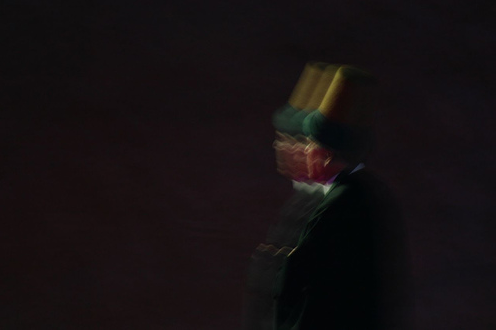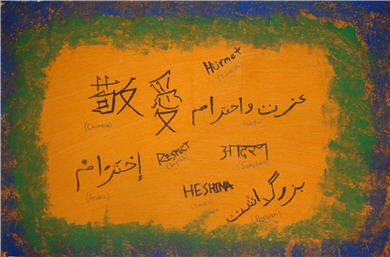Category Archives: Intercultural Communication
A Path Towards Harmony
February 1, 2004 / Dhul Hijjah 1424
Volume 1, Issue 4
The basic concept of mysticism in Islam is to know oneself and to know one’s Creator as the Hadith says:
“Whoever knows himself,
knows his Lord.â€
It is through this process that one discovers the unity in man. Selflessness is the substance of Tasawwuf (Sufism or Islamic Mysticism). Self-discipline is used to raise oneself above the self and identify oneself with the Divine Self. Man has to establish a harmony between his body and soul to reach the Divine Light that Allah Almighty has placed in him. The proper method to reach the Divine is to go through the following stages: Shari’ah (Islamic Outer Law), Tariqah (Islamic Inner Path), and Haqiqah (Ultimate Reality). There is no dichotomy between Tariqah and Shari’ah. Shari’ah refers to the laws that govern man and society.
Tasawwuf can be translated in English as metaphysics. However metaphysics may not explain the full meaning of Tasawwuf. Nevertheless, this is how it is typically translated. People of Tasawwuf are called Sufi (one of the meanings of which reflects the simple, woolen garments worn by the earliest Sufis). In Tasawwuf the first stage is to follow the path led by a Shaykh or Murshid (spiritual guide) on the journey to the soul. This is done through Bai’ah, or spiritual contract where the seeker promises for the sake of Allah and His Messenger (Peace Be Upon Him), giving his word that he or she will try to never commit a sin or do anything against the Shari’ah. In Tasawwuf, taking Bai’ah or giving one’s hand in the hands of one’s Murshid is in reality giving one’s hand in the Hand of Allah Almighty through one’s Murshid who is connected eventually to the Holy Prophet (Peace Be Upon Him) through his spiritual guides in a chain of transmission that connects heart to heart. In Tasawwuf the orders and commands of the spiritual guide must be followed. It is imperative to submit oneself to the Shaykh without any doubts because he is the Ameer (leader). Regarding this, Hazrat Shaykh Ali Hajweri (may Allah Almighty have mercy on him) refers the Quranic ayah:
“O People who believe! Obey Allah and obey the Noble Messenger, and those amongst you who are in authority.â€
[Al-Qur’an 4:59].
Follow Allah Almighty’s orders, and the Noble Prophet’s (Peace Be Upon Him) orders and “ulil amr†means spiritual guides.
A Sufi who chooses the path of Tasawuuf may finally reach the level of a Wali, i.e. a Friend of Allah. The Awliya Kiram (Noble Friends of Allah) and the Ulema Kiram (Noble Scholars of Islam) should not traverse different paths in different directions, but they should meet on the straight path, i.e. the Sirat-ul-Mustaqeem and hand in hand create in the human being the consciousness of the soul and the body. Hazrat Shaykh Ali Hajweri (may Allah Almighty have mercy on him) clearly defines in his book about the importance of the Shar’iah and that the people of Shar’iah could be excellent preachers of Islam through Tasuwwuf. Allah Almighty has said:
“There are servants of God who
walk humbly on earth and when
an ignorant one converses them,
they pray for his welfare.â€
[Al-Quran]
As the Holy Prophet Muhammad (Peace Be Upon Him) said:
“Those who hear the prayers of a Sufi and do not say Ameen, come in the list of the negligent, in the eyes of Allah Almighty.â€
The stated Hadeeth (saying of the Holy Prophet (Peace Be Upon Him)) clearly refers to Sufism and presents a comprehensive knowledge about acceptance in the eyes of Allah Almighty. The Hadeeth proves that Sufism was practiced in the blessed time of our Holy Prophet Muhammad (Peace Be Upon Him).
The people striving to attain and reach the Divine Light are those who curb their worldly requirements and selfishness and submit oneself to the willingness of Allah Almighty and His Beloved Messenger (Peace Be Upon Him). In a Hadeeth, the Holy Prophet (Peace Be Upon Him) said:
“Die before your death.“
When a Sufi attains to Allah Almighty, he never loses Him, and when he loses himself i.e. through the negation of his ego and super ego, he never regains it. This means that when he involves himself in the Dhikr i.e., remembrance of Allah Almighty, he never regains his own personality. According to Hazrat Abul Hasan Husri (may Allah have mercy on him): â€a Sufi is he whose existence has no nonexistence and whose nonexistence has no existence.†Meaning that whatever he attains, he never loses and whatever he loses he never regains.
In short, it can be said that Sufism is a comprehensive applied syllabus of cosmic law (Shari’ah). Mostly, people are confused with their social, political, economical and ethical viewpoints due to lack of knowledge of the Shari’ah which emphasizes human relations, forgiveness, and the most important aspect of society, i.e. tolerance. Tasawwuf is a knowledge of peace and justice, harmony among different cultural groups and supremacy of humanity. Contemporary social order requires comprehensive principles of Tasawwuf to be applied in the different societal institutions for the betterment of state, politics, public administration, international relations with reference to peace and justice in the world.
References: Taken from articles and speeches of Prof. Dr. Manzoor-ud-Din Ahmed, a distinguished professor of Columbia University, USA and Prof. Dr. Mohammed Ahmed Qadri, Founding Director of IECRC in CA, USA.
Sohail Rana Qadri & Aniqa Rana Qadri
Mr. & Mrs. Rana Qadri are active members of IECRC Canada and contributors to the IECRC Newsletter.
Respecting Cultural Values – A Criterion for World Peace
Issue # 13
May 25, 2008 / Jamadul Awwal 1429
Culture is the identity of every nation. It is the sum total of the shared values, emotions, and expressions of a people. Our global world today is a rich collection of ancient and modern cultures.
According to the Islamic tradition, the cultural diversity that comprises the world today is a blessing and by Divine Design. Its purpose is to interact and acquaint ourselves with one another. This interaction allows for increased understanding and subsequent enrichment which in turn contributes towards the promotion of peaceful relations between various communities.
It is the mandate of every religion to protect culture and promote cultural norms. Islam stresses co-existence. The Holy Quran clearly exhorts Muslims to protect the Christian church, the Jewish synagogue, and places of worship of all other peoples as much as they defend their own mosques. This is clear evidence of the emphasis that Islam has laid on tolerance and co-existence with other religions and civilizations. Islam also commands its followers to ensure the protection of all educational, charitable and cultural centers of other civilizations. It may be deduced that the non-profit organizations working in the field of education, health and social welfare all fall into this category. One can also refer to the word Sawamiah used in verse 40 of Chapter Al-Hajj of the Holy Quran, which stipulates that all establishments of other civilizations must be protected.
Whenever Christian scholars came to visit with the Holy Prophet Muhammad (Peace Be Upon Him) for a dialog, he (peace be upon him) arranged their stay in Masjid-e-Nabawi (the blessed mosque of the Holy Prophet, peace be upon him, in the holy city of Medina). On such occasions, the Holy Prophet (Peace Be Upon Him) not only held talks there, but also allowed the Christians to perform their religious rituals within the mosque.
However, one of the greatest problems in the world today is that we have stopped respecting cultures. We have adopted an “us versus them†approach. The modern world is facing serious challenges due to this single reason leading to class wars and unrest in the world.
The Holy Prophet Muhammad (Peace Be Upon Him) respected every culture. While he established an Islamic state in the Holy city of Madinah, he (peace be upon him) did not denigrate the cultural identities of any religion. On the contrary, he promoted the various Arab tribes. He protected synagogues and churches and directed his followers to pay respect to them. Whenever the Holy Prophet (Peace Be Upon Him) went out of the Holy City of Madinah with his noble companions (may Allah be pleased with them all), he did not trespass on the lands that belonged to the Jews and Christians. He (peace be upon him) did not allow the horses to even step foot on those lands that had agricultural crops on them. But he (peace be upon him) commanded his noble companions to protect these lands. In this way he laid the foundations for international law and peace. It is chilling to see that behaviors today are so antithetical to the teachings of this great final Prophet of God who is a Prophet for all of humanity. Peace Be Upon Him.
The Holy Prophet Muhammad (Peace Be Upon Him) practically proved the motto of the Peace Culture which is to “Live and let others live.â€Â “Peace for all†was not just a slogan but he proved it with his pristine teachings, stellar example and kind and forgiving nature that made everyone around him fall in love with his personality, and even his enemies were in awe of him (peace be upon him).
In the society that he created he adopted many techniques to transfer his knowledge to the people. He sent out delegations of His Companions who reflected the culture of peace and respect they had learnt from him. When the Holy Prophet (Peace Be Upon Him) met people, he would stand up out of respect for them.
He created an Administration Culture which centered on truth and honesty. Honesty is the best policy for the government, the legislature, and judiciary. The culture of Islam is that of balance of power and it negates any authoritarian school of thought and promotes a culture of tolerance and peace. In this culture, contrary to popular belief, Allah Almighty and the Holy Prophet (Peace Be Upon Him) have given tremendous amount of respect to women and children in the context of human rights. In this culture the use of force is prohibited. “Might is right†is not a component. The teaching of Islam is that everyone is equal. Modern culture includes language, ideas, beliefs, norms, codes, institutions, tools, techniques, works of art, rituals, ceremonies and symbols. Islam has incorporated these into its fold. Islamic principles teach to take what is good and leave out that which is not good. It is a dynamic body with its foundation anchored on a core firm set of values—the crucial recipe for any religion, culture, institution or individual to survive— the ability to adapt and include.
Today’s IECRC Conference is a bridge between the West and the East, a bridge among nations. The valuable research articles and presentations being made here will be a source of learning and eliminating many stereotypes. Conferences such as this are instrumental in the transformation of international cultural norms.
It is time we let go of the wars of the battlefield and psycho warfare and make working for humanity the aim of our lives. For social and world change it is imperative that the differences between the major world cultures and religions are put on the backburner and the similarities are highlighted. The world is our home and we are all brothers and sisters. All Prophets of God (peace be upon them all) have brought the same message of forgiveness, purification, tolerance, peace, and love. It behooves us to increase our intercultural communication and understanding so that we can make the world a better place for our children.
Prof. Dr. Mohammad Ahmed Qadri
Dr. Qadri is the Founding Director of the IECRC. He is the recipient of many international awards such as the prestigious “Ambassador for Peace†Award presented by the Universal Peace Foundation and Interreligious and International Federation for World Peace in Canada. Please see the section on Speaker Biographies for more details. He can be reached at ahmedq19@yahoo.com.

















